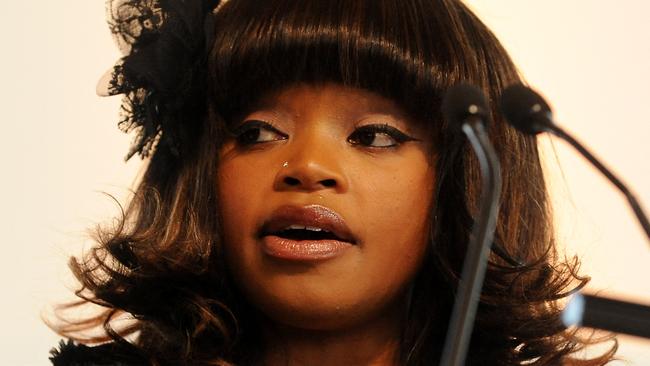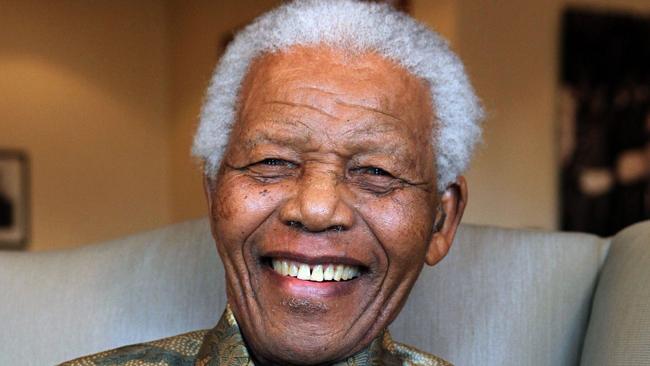Zoleka rose from a life of chaos and addiction to help those in need
Zoleka Mandela was an alcoholic drug addict who lost two children – but she rose above it all to devote her life to helping others.

OBITUARY
Zoleka Mandela
Author and activist. Born Johannesburg, April 9, 1980; died September 25, aged 43.
On Friday they buried Nelson Mandela’s granddaughter next to her mother and grandmother at Fourways Memorial Park cemetery on Johannesburg’s northern outskirts. Fourways describes itself as a place of serenity and tranquillity – hardly words that characterise the lives of its best known residents.
Winnie Mandela was the second wife of South Africa’s anti-apartheid hero and first black president. The early years of her marriage were a time of persecution and imprisonment. The already married Nelson Mandela spotted Winnie waiting for a bus in Soweto in 1957 and asked her on a date. They were married the following year. By 1960 they had daughters Zenani and Zindziswa.
After Nelson was jailed for life in 1962, Winnie inherited much of the responsibility for the campaign against apartheid for which she was put under surveillance and house arrest, then jailed, kept in solitary confinement and even tortured.
She used the international attention she attracted to fight for her husband’s release. In the 1980s she became addicted to alcohol and painkillers, accumulated militant friends and began a violent campaign against police informers while encouraging “necklacing”, in which tyres filled with petrol were put over victims’ heads and set alight. Eventually she was convicted of kidnapping a 14-year-old boy who was later murdered. Nelson divorced her after two years of freedom and cut her from his will.
When Zindziswa was born, her parents’ names were on wanted lists. At times, when both were imprisoned, she was cared for by the older Zenani. She finished schooling in Swaziland. It was Zindziswa who read to the world her father’s letter rejecting a 1985 conditional offer of freedom from the white South African regime.
She once arranged a boxing match between Floyd Joy Mayweather and Manny Pacquiao, but when the deal fell through she was sued for more than $7m. In 2014 she was appointed ambassador to Denmark, but her term came to end when, in a series of tweets, she described opponents at home as “trembling white cowards” and “thieving rapists”. She died in 2020 aged 59, hours after testing positive for Covid.
Her daughter Zoleka was born in 1980 when Zindziswa was 19. Zoleka later revealed that for years she was sexually abused “by both the men and women in my life”, a trauma that led to self-harm and suicide attempts.
“I spent decades blaming myself,” she said. In an effort to blank out the pain she developed addictions to alcohol, drugs and sex. “I was desperate to feel something good,” she wrote a decade ago. “I felt I didn’t have the right or strength to live.”
While battling all this she had her first child in 1997, a daughter she named Zenani after her aunt. The following year she gave birth to a boy who died within days.
In 2010, Zenani, aged 13, was returning home from a concert to mark the opening of the soccer World Cup in South Africa when she was killed by a drunk driver. Her mother had not seen her in 10 days. “I hadn’t because I chose to use drugs,” Zoleka said at the time. It was a reminder “I chose my addiction over my kids and I have to live with that for the rest of my life”. A frail Nelson Mandela attended the funeral, his final public outing.

The fates weren’t finished with Zoleka; she was diagnosed with breast cancer the following year but, with a spirit as noble as her grandfather’s, rose from the ashes of that life, defeated her addictions and bravely wrote of it all in a best-selling biography, When Hope Whispers. In it she spoke of her brutal experiences and growing up in a violent, racist country with her grandfather internationally lauded but in jail.
She also established the Zoleka Mandela Foundation, which raised funds and awareness about breast cancer and road safety: deaths on South Africa’s roads total about 13,000 each year and represent half of all teenage deaths (Australia, with half the population, has about 1100 deaths annually); and while the rate of breast cancer in South Africa is relatively low, women present with symptoms much later, meaning the mortality rate in much higher.
Hers was a life against the odds. Her cancer returned in 2016 and again in September last year, overwhelming her vital organs including her brain. She became a UN global ambassador on non-communicable diseases. Once more she turned to campaigning for greater awareness of the disease and its early detection while completing another memoir and preparing her children for lives without her.





To join the conversation, please log in. Don't have an account? Register
Join the conversation, you are commenting as Logout